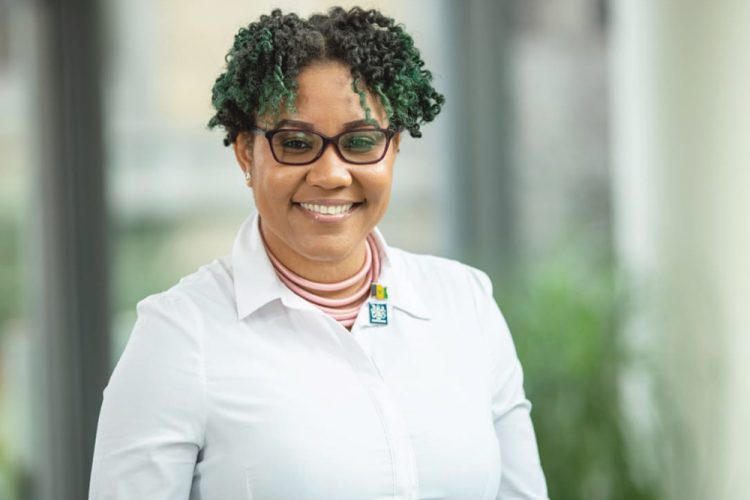Tedra Kirby: Miss-Communication part 1

by Heidi Badenock
In this second instalment of political incorrectness dubbed “Miss-Communication” we meet Tedra Kirby, a bright light with an even brighter future.
Tedra Kirby is a communications specialist and Communications & Marketing Manager at the St Vincent and the Grenadines Community College. Once known as a talkative young lady from the leeward side of mainland St Vincent, Tedra has used her penchant for speaking up and out into a professional qualification which is essential in this age of technology. In this interview with Tedra, our conversation covers a wide range of topics.
Q: Would 15-year-old Tedra be surprised about where you are professionally today?
“Perhaps, but not because of my professional growth or where I am academically but more on the basis of maturity…It’s always been a situation where I end up using my voice and being in the position where I would talk because that has always naturally been me, it’s almost instinctive at this point this would be the career focus that I would eventually choose.”
Q: What would you say has been the most important decision that you have made in your adult life so far?
“Professionally? I would say…The most significant in terms of my development would have been the decision to go to the University of the West Indies (UWI) and double major with one of those majors being communication studies because that single decision was the decision that put me on the path that I am on currently, that single decision was the decision that started everything. Every calculated step that I have taken professionally, every experience that I have had after would have been a direct result of that single decision to pursue my passion, pursue my excellence and go to the UWI to study Communication Studies.
Q: Do you think that we’ve moved away from the foreign is better mindset as it relates to tertiary education?
“Currently, I think unfortunately that mindset is still widespread. However, having experienced both international and Caribbean educational journeys, I know for a fact that it was that Caribbean foundation that allowed me to be so well-rounded and knowledgeable when I went into an international setting. It was that sense of pride and foundation that the UWI instilled in me that allowed me to go to England in the next academic step and proudly display my knowledge, my sense of culture and Caribbean pride. There is the inability for some people to shake that sense of inferiority and I don’t even know if it is a conscious thing for some people, but when that sense of inferiority has been embedded in your DNA through enslavement, it takes a strong individual born into a strong society to really change that, and I know for me I owe a lot to my family and to very influential teachers especially those who taught me history to really appreciate that.
We need to move away from that inferiority complex…A lot of international students come to the UWI to study and it is not just for a sunshine getaway experience but the fact that whatever the UWI offers aligns with what the schools in their [countries] offer…When it comes to inferiority and studying in the Caribbean it is something we need to break free from, it’s an ancestral chain that still bounds us down.”
Q: Would you say that our generation is less inclined to feel that pursuing tertiary education at institutions outside of the Caribbean Region makes them better than those who go to regional institutions?
“I would hope so! Because this sense of going to this foreign school is better is born out of this period of history with enslavement.. when [they] got enough money, especially for the [more privileged] when [they] got enough money, they would send their kids back to the UK and back to wherever to go to school as that was seen as a sign of elevation. But when you look around the Caribbean and you see people in our generation in their different fields…and you realise the quality of individuals we’ve been able to produce right here in the Caribbean are able to rival those educated outside of the Caribbean then it is evident that we are just as good, that there is nothing that separates our excellence from their excellence, the only thing is that we need to learn to appreciate it more. With that said, I would always be vocal about making Caribbean History mandatory for all secondary school students, just as we insist with Maths and English”
Q: What are your hopes for regionalism based on your experience at the UWI?
“…Some may say that it is unrealistic or unachievable…in terms of the Caribbean and how we interact with each other…For me, I do believe that unity is possible. But for that to be possible we need to unlearn a lot of things… this sense that this country is better than that country because we have this resource or that resource. It takes a lot of unlearning for that to happen. But with anything, unity is always strength and until we achieve true unity, until we see the Caribbean as a true community and not as segments within a community, I don’t know how possible that is. We borrow aspects of each other’s culture all the time and I am fortunate enough to instil in students every year a sense of regionalism whenever we cover Caribbean Integration. So, I am mindful of the things that hinder integration.”
l A continuation of Tedra’s interview will follow next week.









